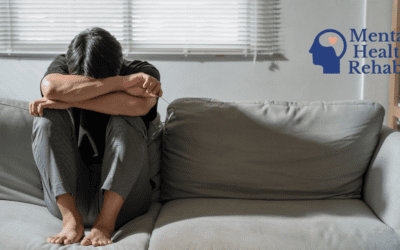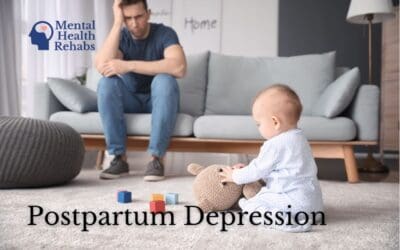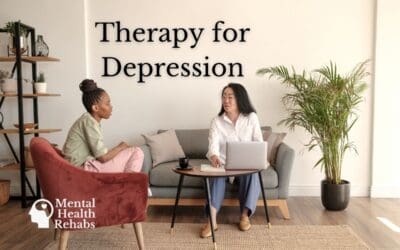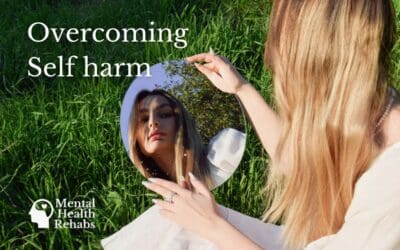Depression.
According to the CDC, a 2019 study found that 18.5% of adults had symptoms of depression within the past 2 weeks. From this study, it could be inferred that nearly 1/5 of the United States population may be struggling with depression at any one point in time, making it one of the most common health issues in the country.

What is Depression?
It is difficult to put what depression is into words. Most often, depression is described as a state of intense sadness. While sadness is often a part of depression, it is so much more. Depression is a mood disorder most commonly characterized by the following symptoms:
- Trouble sleeping
- Unusual appetite
- Difficulty concentrating
- Lack of energy
- Loss of interest in activities
- Feelings of hopelessness or guilt
- Physical aches and pains
- Suicidal thoughts
Criteria for Diagnosing Depression
A depression diagnosis is based on whether the individual is experiencing a depressive episode lasting longer than two weeks. A depressive episode is when you experience some or all of the symptoms listed above.
Treating Depression
While everyone’s experience with depression is different, it is a treatable condition. Treatment should be individualized based on each individual’s needs and may include one of multiple of the following:
Psychotherapy
Psychotherapy, including cognitive processing therapy and group therapy. Other psychotherapies include cognitive processing therapy (CPT), cognitive behavioral therapy (CBT), and eye movement desensitization and reprocessing (EMDR).
Medications
There are a wide variety of medications to treat depression in combination with other treatments.
Exercise
Physical activity has been proven to boost mood and reduce feelings of sadness. Regular exercise is highly effective in treating mild to moderate depression.
Brain Stimulation Therapies
When depression is unresponsive to other treatments or is severe, brain stimulation may provide rapid results.
Light Therapy
Exposure to certain types of light can be particularly effective in treating seasonal depression.
Alternative Approaches
Alternative therapies such as acupressure, chiropractic, and yoga have shown positive results in treating various levels of depression.
Depression and Substance Abuse
Feelings of depression can lead to all sorts of actions to try and cope, even if they are particularly healthy coping mechanisms. Drinking alcohol, doing drugs, and abusing prescription medication are all possibilities.
In general, substance abuse and mental health disorders are unfortunately more common than you may think. If this is the case, a dual diagnosis treatment program may be the best route for recovery.
Types of Depression
In addition to Major Depressive Disorder, there are several ways depression presents itself and multiple reasons it is brought on. These factors may point to another form of depression:
Bipolar Disorder
Bipolar is characterized by episodes of highs (mania) and lows (depression).
Postpartum Depression
Depression onset within a year following the birth of a child.
Seasonal Depression
Also known as Seasonal Affective Disorder (SAD).
Related Articles
6 Factors You Shouldn’t Ignore When It Comes to Mental Health
It's easy to sideline mental health amidst daily commitments and routines in our fast-paced world. Often, we only recognize its significance when facing burnout or health issues. The gravity of this oversight is evident in the fact that, as of 2021, 9.2 million U.S....
4 Postpartum Depression Treatment Options Parents Should Consider
Women undergo a radical and rapid hormone change in the weeks immediately preceding and following childbirth. These fluctuations can result in the mood disorder known as postpartum depression (PPD), which is estimated to affect around one in five mothers. Unlike “baby...
8 Recommended Types of Therapy for Depression
Depression is a mental health disorder that affects millions of people worldwide. It can significantly impact an individual's daily life, making it difficult to carry out basic tasks, work, and maintain relationships. While medication can help alleviate symptoms,...
6 Tips on How to Stop Self Harm
Self-harm is a serious and often misunderstood problem that affects many people. If you or someone you know is struggling with self-harm, it's important to know that help is available. People who self-harm often experience mental health issues like depression,...
Don’t Struggle Alone.
Get Help Today.
Reaching out for help for yourself or a loved one can be overwhelming and stressful, but it doesn’t have to be. If you are struggling to find the right help, or even know where to get started, please feel free to call our 24/7 helpline.
Begin your mental health journey right now!





